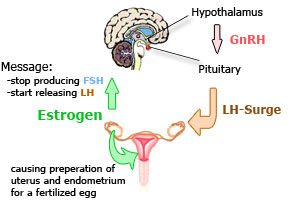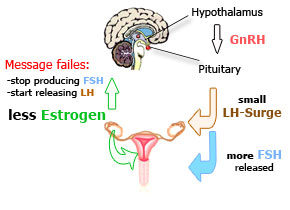 |
 |
|
|
| |
|
| |
|
 |
|
 |
|
 |
|
 |
|
| |
|
| |
|
| |
|
 |
|
 |
Perimenopause |
|
Perimenopause means literally "around menopause" and is a transitional stage of two to ten years before complete cessation of the menstrual period. Perimenopause usually appears in women from 35 to 50 years of age. This stage of menopause is characterized by hormone fluctuations, which cause the typical menopause symptoms like menstrual irregularity. Perimenopause is defined as the transitional time between the first irregular menstrual periods to the last one. As seen in the previous chapter (premenopause) the �normal� menstrual cycle is the hormonal balance between estrogen, progesterone, FSH and LH. The fluctuations of these hormones cause the symptoms of perimenopause. These hormonal fluctuations vary among women, and consequently, each woman will get to know perimenopause differently. It is said that a woman usually has an experience similar to her mother's, but no woman can predict which symptoms she will experience or when she will experience them. Pregnancies, birth control pills, the age when a woman began to menstruate, and breast-feeding have no impact on the beginning of perimenopause. The only reliable factor is smoking. If a woman smokes, she can count on starting perimenopause 1-2 years earlier than women who don't. |
|
Does primrose oil work for
perimenopause?
|
|
|
|
Primrose oil is said to relieve hot
flashes for women undergoing perimenopause. To find out if this was true, a research was conducted in the U.K with 28 perimenopausal� |
|
Am I going through the
perimenopausal stage?
|
|
June 11, 2007 |
|
Women are concerned whether
they are starting a perimenopause stage. Here you will find the best predictors to know if you are already going through perimenopause� |
|
| In summary, perimenopause can best be described as the time when a body gets ready for menopause. |
REFERENCES: Pat Camillo. "Your Inner Estrogen: An Individualized, Natural Approach to
| Menopause Home | Stages of Menopause | Symptoms of Menopause | Treatment of Menopause | Menopause FAQ |
| PERIMENOPAUSE |
| perimenopause symptoms | perimenopause | perimenopause symptoms | perimenopause treatment |
| ©Copyright 2008. Perimenopause. All rights reserved. |
| Providing information on: Menopause Stages, Premenopause, Perimenopause, Menopause, Postmenopause. |

